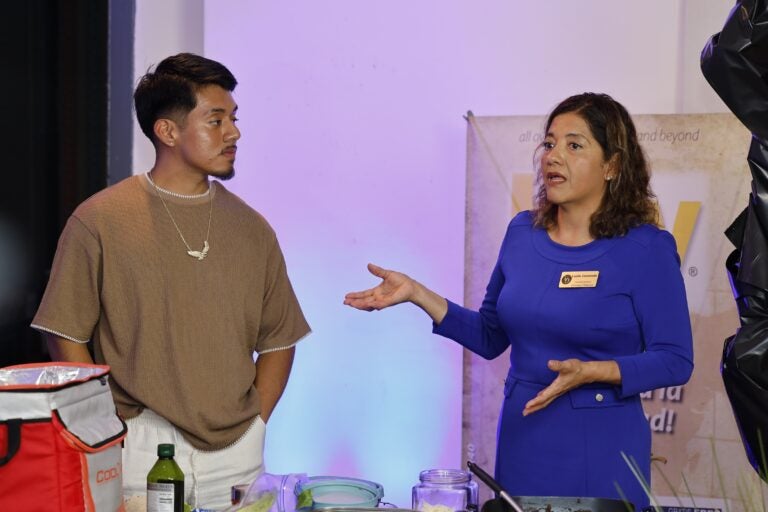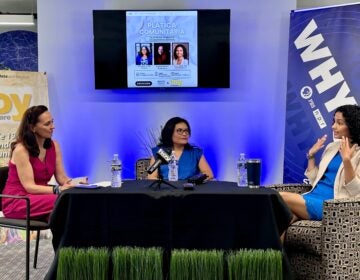Wilmington event helps Latino families rethink nutrition, preserve traditions and tackle chronic illness
A community talk in Wilmington taught Latino families how to preserve traditions while making healthier, more informed food choices.
Listen 1:28
University of Delaware nutrition specialist Guadalupe Castañeda talks with WHYY News Delaware reporter Johnny Perez-Gonzalez about how members of the Latino community can preserve culinary traditions while protecting their health. (Courtesy Hoy en Delaware)
What are journalists missing from the state of Delaware? What would you most like WHYY News to cover? Let us know.
A recent event at the newspaper Hoy en Delaware’s Wilmington office shed light on the nutritional struggles many Latino families face in the United States. As part of the Primer Estado civic engagement series — produced by WHYY News in collaboration with Hoy en Delaware — the conversation focused on how diets shift in the U.S. and how families can preserve culinary traditions while protecting their health.
The event was held Thursday in a hybrid format, allowing community members to attend in person or online. It also served as part of the ongoing Plática Comunitaria miniseries, with this session focusing on how food can nourish and prevent disease. Nutrition specialist Guadalupe Castañeda from the University of Delaware led the conversation, breaking down the link between food access, education and chronic illness in the Latino community.
“Yo siempre digo que estamos muy bendecidos porque tenemos muchos alimentos. El problema es que no tenemos la educación para saber cuáles son los alimentos correctos y cómo comerlos”, ella dijo. “Cuando nosotros aprendemos a comer adecuadamente y a porcionarnos, pues obviamente vamos a tener mejor salud, pero desafortunadamente aquí en el estado por información de la división de salud, uno de cada tres personas adultas tiene problemas de obesidad.”
“I always say we are very blessed because we have a lot of food. The problem is that we don’t have the education to know what the right foods are and how to eat them,” she said. “When we learn to eat properly and portion wisely, we’ll obviously have better health, but unfortunately here in the state, according to data from the Department of Health, one in three adults has obesity problems.”
Castañeda later opened the discussion to the consequences of not eating healthier or making more intentional food choices, pointing to health issues that disproportionately affect Latino communities.
“Una de las enfermedades que es la más frecuente, pues realmente la primera es obesidad y de la obesidad se derivan más enfermedades y entre una de ellas es la diabetes. Hay una población que es grande y tiene prediabetes y tiene diabetes”, ella dijo. “Y ahorita la verdad es preocupante porque del 2011 al 2022 subió drásticamente el porcentaje de personas. Ahorita hay un 37.9% de personas con enfermedades crónicas.”
“One of the most common diseases, well, the first one is obesity, and obesity leads to more diseases, and one of them is diabetes. There’s a large population that has prediabetes and diabetes,” she said. “Right now, it’s really worrying because from 2011 to 2022, the percentage of people increased dramatically. Right now, 37.9% of people have chronic diseases.”

She went on to explain some of the dietary habits and behaviors contributing to these statistics — not from malice or neglect, but from lack of knowledge and systemic barriers.
“Las prácticas negativas que a lo mejor no sabemos y que no nos damos cuenta es que nosotros, la mayoría, comemos más proteína y carbohidratos y no añadimos vegetales. De hecho, solo el 12% de la población consume frutas y vegetales. O sea, es muy poquito a comparación de tantas personas que somos aquí”, ella añadió.
“The negative practices that we may not be aware of and don’t realize are that most of us eat more protein and carbohydrates and don’t add vegetables. In fact, only 12% of the population consumes fruits and vegetables. That’s very little compared to the number of people here,” she added.
At that point in the conversation, Castañeda laid the foundation for what a healthy plate should look like. She introduced a visual nutritional guide — a plate divided into categories — and walked participants through each element.
“El plato nos dice perfectamente que la mitad de nuestro plato debe de ser vegetales. Aunque tiene aquí la fruta, pero la fruta yo digo, siempre la pongo mejor a un ladito, ¿verdad? Entonces, nuestra porción de proteína tenemos también y tenemos nuestra porción de granos y aquí lácteos. Un buen plato y una buena alimentación empieza desde la mañana”, dijo ella.
“The plate tells us perfectly that half of our plate should be vegetables. Although it has fruit here, I always say, I prefer to put fruit on the side, right? So, we also have our portion of protein, and we have our portion of grains, and here we have dairy. A good plate and good nutrition starts in the morning,” she said.
She also noted that portioning meals appropriately is critical to a healthier lifestyle — especially because nutritional needs differ between individuals. She explained that a woman’s plate should not mirror a man’s plate, and that physical activity, age and lifestyle all influence what and how much someone should eat.
With the federal government considering cuts to programs like EBT and SNAP, Castañeda acknowledged the added pressure this places on families. Still, she reminded attendees that some resources remain available — particularly through community organizations.
“Hay organizaciones, las iglesias que les donan, el Food Bank de Delaware les dona a ellos y ellos ya les preparan sus canastas y ya se llevan vegetales, se llevan productos”, ella dijo. “Entonces, pues todavía recursos hay … recursos que la comunidad puede seguir teniendo.”
“There are organizations, churches that donate to them, the Food Bank of Delaware donates to them, and they prepare their baskets and take vegetables and produce,” she said. “So, there are still resources … resources that the community can continue to access.”

To close the event, Castañeda led a live demonstration of a plant-based burrito recipe, offering families a real-time example of how healthy eating can also be flavorful, budget-friendly and culturally relevant. The dish included beans, grated carrots, onion, garlic, mozzarella cheese, lettuce and a flour tortilla — all ingredients meant to align with the balanced plate she described earlier.
She ended the event by reminding the audience of a fundamental truth:
“La alimentación es tan importante, o sea, es la base de nuestra vida, porque si nosotros aprendemos a comer y balancear nuestros alimentos porcionándolos, pues obviamente vamos a tener una mejor calidad de vida”, ella dijo.
“Food is so important. I mean, it’s the foundation of our lives, because if we learn to eat and balance our meals by portioning them, then we’ll obviously have a better quality of life,” she said.
Esta historia fue financiada por una subvención de cobertura de la Corporación para la Radiodifusión Pública.

Get daily updates from WHYY News!
WHYY is your source for fact-based, in-depth journalism and information. As a nonprofit organization, we rely on financial support from readers like you. Please give today.







